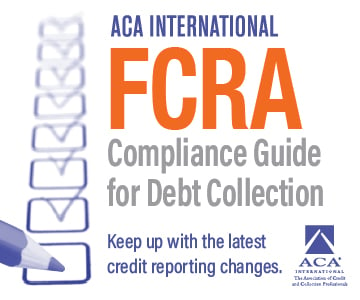 The case will decide whether the Chevron doctrine, which requires courts to turn to federal agencies’ interpretation of the law in certain situations, stands.
The case will decide whether the Chevron doctrine, which requires courts to turn to federal agencies’ interpretation of the law in certain situations, stands.
05/03/2023 9:45 A.M.
4 minute read
The U.S. Supreme Court has granted a petition to review a case where it could overturn or restrict the Chevron doctrine, a two-step analysis “that generally requires a federal court when reviewing federal agency action to defer to the agency’s reasonable interpretation of an ambiguous statute,” according to an article from ACA International member firm Troutman Pepper.
The case, Loper Bright Enterprises v. Raimondo, was granted review by the U.S. Supreme Court May 1.
“The [c]ourt overruling or limiting Chevron would constitute a watershed decision in administrative law, greatly increasing the prospects of businesses, organizations, and individuals successfully challenging administrative action in court under the Administrative Procedure Act,” according to Troutman Pepper.
For background, Troutman Pepper reports, “[t]he Chevron doctrine rests on the presumption that in many circumstances, ‘a statute’s ambiguity constitutes an implicit delegation from Congress to the agency to fill in the statutory gaps.’ FDA v. Brown & Williamson Tobacco Corp., 529 U.S. 120, 159 (2000).”
The Supreme Court introduced the Chevron analysis in 1984, and it has come under review recently “on separation-of-powers grounds from multiple Supreme Court justices and numerous federal judges in lower courts.”
The firm explains the case headed to the Supreme Court here:
“Now, the [c]ourt is poised to decide directly whether to overrule or limit the Chevron doctrine. In Loper, several New Jersey herring fishers challenge the National Marine Fisheries Service’s (NMFS) claimed authority under the Magnuson-Stevens Act (the [a]ct) to require fishers to pay the salaries of certain on-board federal observers stationed on the fishers’ vessels to monitor their compliance with federal law. The [a]ct itself is silent on the relevant point, but applying Chevron deference, the D.C. Circuit (over a dissent) ruled in favor of the NMFS, deferring to the agency’s interpretation of the [a]ct. The Loper petitioners, joined by 18 states as amici, among others, now ask the [c]ourt to overrule the Chevron doctrine or, at minimum, significantly limit its scope.”
Chevron Analysis in ARM Industry Cases
The Chevron analysis has been used in an Equal Credit Opportunity Act (ECOA) case as well as a model validation notice (MVN) case in the last year.
According to ACA International’s SearchPoint on the ECOA (PDF), the full scale Chevron analysis is “used to determine the extent to which a court reviewing agency action should give deference to the agency’s construction of a statute that the agency had been authorized to administer.”
In the ECOA case, a district court dismissed an enforcement action from the Consumer Financial Protection Bureau stating the defendants violated the act, ACA previously reported.
In July 2020, the CFPB filed a lawsuit against Townstone Financial Inc. in the U.S. District Court for the Northern District of Illinois for alleged violations of the ECOA, according to the CFPB website for the case.
Another component of this case is the Chevron test, which stems from a U.S. Supreme Court decision in Chevron, U.S.A., Inc., v. Natural Resources Defense Council, Inc. The test considers if a court should rely on an agency’s (such as the CFPB’s) meaning of a statute, according to a case summary from Ballard Spahr LLP.
In the MVN case, a judge in the U.S. District Court for the Southern District of Florida decided that the MVN safe harbor provides nearly no cover from consumers’ claims.
It marks the substantive decision about the scope of the safe harbor provided under Regulation F for debt collectors using the CFPB’s (MVN), ACA previously reported.
The decision in Roger v. GC Services, L.P. came in response to the defendant’s motion to dismiss. The defendant argued that its validation notice conformed “exactly” to the MVN as published in the CFPB’s final rule and therefore enjoyed the “information and form” safe harbor afforded under Reg F.
Although the plaintiff argued in its opposition to GC Services’ motion for dismissal that the court need not defer to the CFPB’s regulations under the so-called Chevron doctrine, the judge’s opinion never engages in the two-step Chevron analysis.
Rather, the opinion leaps into uncharted waters with this statement: “The parties’ competing arguments about the validity of the CFPB’s regulations [under a Chevron analysis] largely miss the point. Plaintiff does not allege that Defendant violated any CFPB regulations; he alleges violations of the FDCPA.” (Emphasis added.)
Impact on Administrative Law
If the Supreme Court rules in favor of the petitioners in Loper to overturn or restrict Chevron, Troutman Pepper says it would have a significant impact on administrative law.
“The judicial scales will no longer be tipped in favor of federal agencies, at least so far as statutory interpretation is concerned, and APA claims challenging the validity of an agency’s interpretation of its operating statute would more likely succeed,” according to the firm. “For now, while we wait for a decision in Loper, litigants currently engaged, or who expect to be engaged, in APA litigation should assess whether their cases could benefit from a stay pending the [c]ourt’s decision.”
Remember, subscribe to ACA Daily and Member Alerts under your My ACA profile when logged in to acainternational.org to receive updates on the ACA Huddle.
 The case will decide whether the Chevron doctrine, which requires courts to turn to federal agencies’ interpretation of the law in certain situations, stands.
The case will decide whether the Chevron doctrine, which requires courts to turn to federal agencies’ interpretation of the law in certain situations, stands.









